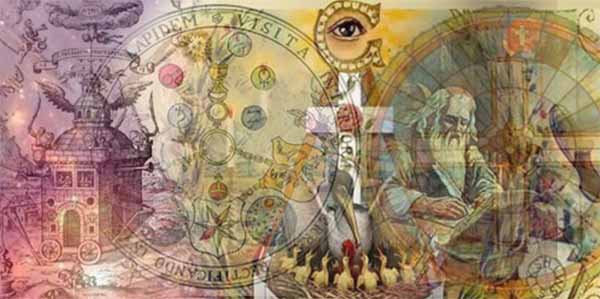Secrets of the Mystical Order of Rosicrucians

Born in 1614 from the imagination of three Lutheran intellectuals, the word Rosicrucian does not designate a continuous stream of thought. It is, through the ages, used by various esoteric associations unrelated to the ideas originally formulated.
Alchemist revelations
In 1614, a Latin manifesto appeared in Germany, the Fama fraternitatis - the Echoes of the Fraternity of the Rosicrucians, accompanied by treatises and letters, and in particular by a biography of Christian Rosenkreuz, magus of the 14th century, visitor from the Orient and mystical thinker.
The avowed pretext for the publication is the discovery of Rosenkreuz's tomb in 1604: it would have contained parchments covered with magic formulas, rules of life as well as many rosicrucian secrets. The work was republished the following year, in German, supplemented by a Confession of the Brotherhood of the Rose-Cross promising readers marvelous alchemical revelations. In 1616, a third text completed the previous two: The Chymical Wedding by Christian Rosenkreuz. The character's fascinating life story is certainly imaginary. The message conveyed, once stripped of its esoteric formatting, is clear: the real research must be done in itself, the light does not come from outside but from within. In these troubled years when the tension between reformed countries and countries loyal to Rome was growing - it would lead to the Thirty Years' War - the writer of this simple but irrefutable message sent back to back Catholics and Protestants by opposing them the sincerity of the faith.
A tremendous success
Of the three works published between 1614 and 1616, only one is signed - the last. Its author, Johannes Andreae, is a Lutheran deacon who lives in Tübingen. Together with two of his friends, Christoph Besold and Tobias Hess, he claims to have created the "laudable Order of the Rose Cross". In fact, no more than Christian Rosenkreuz, this order does not exist. The invention is only a pretext to write a mystical program, a learned joke for these three intellectuals who form what is today called "the cenacle of Tübingen". But, from 1616, Andreae, Besold and Hess were overwhelmed by their creation: the Rose-Cross, launched like a game, became a reality. In several cities of Europe there are Rose-Cross lodges, unrelated to the Cenacle of Tübingen.
An intellectual bric-a-brac
Magi and charlatans proclaim themselves to be great masters or high initiates of an order that has never been a reality! Anxious to stand out, Andreae disavows these associations. He and his friends stop referring to the Rose-Cross. Nothing helps: references to "The Order" are multiplying in publications. The English Fludd claimed it in 1617, the German Maier used it in 1622, Francis Bacon was influenced by the ideas that the Rosicrucian “tradition” was supposed to embody when he wrote his New Atlantis, the French philosopher Descartes himself is suspected of belonging to the fraternity.
Throughout the 18th and 19th centuries, rose-cross societies multiplied without any connection or logic. Many groups, which simply seek to give themselves a halo of mystery, adopt this name, thus maintaining the confusion.
The "Wars of the Roses"
In France, the history of the rose-cross took off at the end of the 19th century. In 1888, the young poet Stanislas de Guaita founded the "Kabbalistic Order of the Rose-Cross", dedicated to spiritualist and esoteric ideas. The doctor Gérard Encausse, who signs the pseudonym of Papus, and the polygraph Joséphin Péladan join this new Rosicrucian avatar. Guaita is a contemplative hermetist, Péladan a rough whimsical. He gives himself the title of sar, proof of his filiation with a former king of Babylon ...
In 1890, unable to bear not to be the grand master, he set up a competing association: "the Order of the Catholic Rose-Cross", which "focused its light efforts on the artistic level". While working to define an idealistic and mystical aesthetic doctrine, the two orders revolted each other and wrote pamphlets. The delighted public follows the evolution of the "Wars of the Roses", made spicy by the eccentricity of the sar and a few pistol duels on the Pré-Catelan! The reputation of the Rosicrucians, already confused, obviously does not gain in seriousness.









































































































































































































































































































































